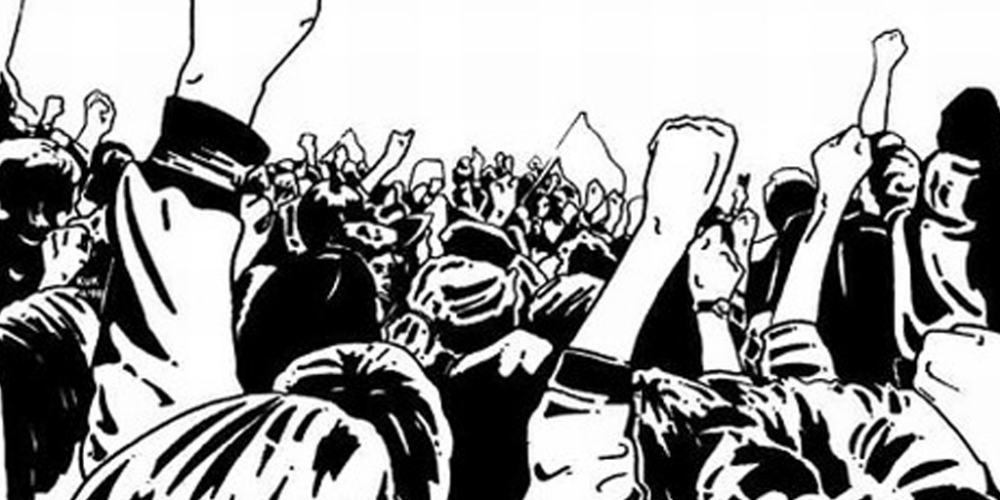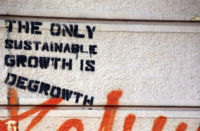It would appear that, one way or another, humans have always been trying to find a better way to live and survive in the world, particularly from a materialist viewpoint, to meet their needs and develop their capacities—not always with success—by their own volition or as they would want it to be.
It could be said that when people set up their “one-man band” or “one-woman band” businesses there is a conscious attempt to break out of the wage-slave system. They may well be wrong about that and end up under even greater strain or insecurity than if they were just employed. Unfortunately too, once their business begins to expand, if it does, they will end up exploiting other workers, which defeats the original “your own business” concept. They will also end up trapped and exploited themselves, at their level within the capitalist pyramid.
We know that the earliest human societies held co-operation in work as a normal and necessary way of life; work was a means to an end, to provide food and shelter. In Ireland the meitheal was a system of shared and reciprocal methods of working.
Once the Industrial Revolution gathered pace, these work methods died a slow death. The “dog eat dog” society was to the fore, although even today, in agriculture in particular, there is still neighbourly reciprocal work, though inescapably as a part of factory farming in the race to the bottom within the neoliberal capitalist system. To the people involved it’s just “common sense” to help your neighbour. They don’t know or appreciate the politics of capitalism and co-operating.
From the eighteenth century the worker co-operative system, which evolved in response to the Industrial Revolution and its horrors for workers, has been developing around the world. While it still exists within the capitalist system, it has proved to be one way of having a more democratic system of work. There are many examples of worker co-ops around the world: Mondragón in Spain, Emilia Romagna in Italy, and Central and South America. Countries building socialism, such as China, Venezuela, and Cuba, also have varying degrees of worker co-operatives.
The question for Marxists, however, is: Is this the road to socialism, or an abandonment of class struggle?
So, are worker co-ops classless enterprises within capitalism—nice capitalism—or temporarily taming it? Will even radical worker co-ops be eventually drowned in the sea of capitalism?
The data from around the world would appear to suggest that that is not the case. And there are many examples in the world today of successful worker co-ops, despite the odds. But what does that say about the politics of revolution?
Lenin recognised that there was going to be some period of transition between ending capitalism and the evolving of socialism. He wrote: “The transition from capitalism to communism certainly cannot but yield a tremendous abundance and variety of political forms, but the essence will inevitably be the same: the dictatorship of the proletariat.”¹
Marx never doubted that “in the course of the transition to a wholly Communist economy, widespread use would have to be made of co-operative management as an intermediate stage.”² He also stated that “a Communist society . . . will not develop . . . from its own foundations . . . as it emerges from capitalist society; which thus in every respect, economically, morally and intellectually, is still stamped with the birth marks of the old society from whose womb it emerges.”³
With the developing, emerging intermediate stage (or stages) and transitioning from capitalism to socialism, and on to communism, there appears to be an awful lot of unavoidable thinking about dialectics.
So can we say that worker co-ops, while working within capitalism, can be used to prepare people for the transition to socialism? Will they begin to develop a class-consciousness in workers? Will this end the selfish, individualist, atomised society that is our present neoliberal capitalist ethos? Will the “new radical revolutionary person” evolve from this new work democracy? Will co-ops bring a realisation that there is a world beyond capitalism?
There would probably need to be a critical mass of worker co-ops evolving from the people—not the state, which would be using them to prop up capitalism and co-opt, or even destroy, worker co-ops. If multiple levels of businesses—agriculture, electronics and manufacturing—were run as worker co-ops, could that tip the balance against capitalist inequality and exploitation?
Serious political and legal change would also need to happen. The parallel development of a participatory people’s democracy and the empowerment of community would certainly be a catalyst for improvement in people’s lives and promote wider socialist thinking. Would such development be transformative reform, or is it just liberal social-democratic thinking?
However, Che Guevara once said, “We have no right to believe freedom can come without struggle.” At what point along the line of struggle are we deemed to be reformist, transforming reformers, evolutionary, or revolutionary? Do I detect more dialectics coming on?
1. Lenin, The State and Revolution.
2. Engels, Letter to Bebel (1886).
3. Marx, Critique of the Gotha Programme.






